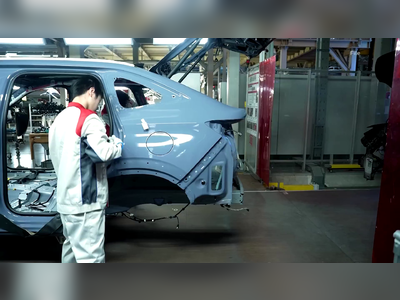German Industry Faces Job Losses Amid Ongoing Economic Crisis
The automotive sector has seen significant cuts, with more than 100,000 jobs lost in the past year.
In the past year, Germany's industrial sector has lost over 100,000 jobs due to the prevailing economic crisis, with the automotive industry being the hardest hit, according to an analysis by a consulting firm.
Specifically, approximately 45,400 jobs have been eliminated within the automotive sector alone.
As of the end of the first quarter, the German industrial workforce numbered 5.46 million, a decrease of 1.8% or 101,000 from the previous year, based on data from the Federal Statistical Office.
Since 2019, prior to the onset of the coronavirus pandemic, the total number of employed in the industry has declined by 217,000, representing a decrease of 3.8%.
In contrast, 2018 saw the industry peak with approximately 5.7 million employed individuals.
The challenges faced by industrial companies in Germany are significant.
According to the CEO of the consulting firm, aggressive competition, particularly from China, has led to price reductions.
Key markets are weakening, demand in Europe remains stagnant at low levels, and there is considerable uncertainty surrounding the U.S. market.
Concurrently, companies are grappling with high operational costs, notably for energy and staffing.
The outlook for job cuts remains bleak, as the CEO indicated.
Revenues within the German industrial sector have continued to decline gradually following a downturn that began in early 2024. It is projected that by the end of the year, at least an additional 70,000 jobs will be lost in the sector.
Companies, particularly within machinery and automotive industries, have initiated cost-cutting programs in response to these challenges.
The current economic conditions suggest that further adverse news may be on the horizon before the situation begins to improve.
Specifically, approximately 45,400 jobs have been eliminated within the automotive sector alone.
As of the end of the first quarter, the German industrial workforce numbered 5.46 million, a decrease of 1.8% or 101,000 from the previous year, based on data from the Federal Statistical Office.
Since 2019, prior to the onset of the coronavirus pandemic, the total number of employed in the industry has declined by 217,000, representing a decrease of 3.8%.
In contrast, 2018 saw the industry peak with approximately 5.7 million employed individuals.
The challenges faced by industrial companies in Germany are significant.
According to the CEO of the consulting firm, aggressive competition, particularly from China, has led to price reductions.
Key markets are weakening, demand in Europe remains stagnant at low levels, and there is considerable uncertainty surrounding the U.S. market.
Concurrently, companies are grappling with high operational costs, notably for energy and staffing.
The outlook for job cuts remains bleak, as the CEO indicated.
Revenues within the German industrial sector have continued to decline gradually following a downturn that began in early 2024. It is projected that by the end of the year, at least an additional 70,000 jobs will be lost in the sector.
Companies, particularly within machinery and automotive industries, have initiated cost-cutting programs in response to these challenges.
The current economic conditions suggest that further adverse news may be on the horizon before the situation begins to improve.
AI Disclaimer: An advanced artificial intelligence (AI) system generated the content of this page on its own. This innovative technology conducts extensive research from a variety of reliable sources, performs rigorous fact-checking and verification, cleans up and balances biased or manipulated content, and presents a minimal factual summary that is just enough yet essential for you to function as an informed and educated citizen. Please keep in mind, however, that this system is an evolving technology, and as a result, the article may contain accidental inaccuracies or errors. We urge you to help us improve our site by reporting any inaccuracies you find using the "Contact Us" link at the bottom of this page. Your helpful feedback helps us improve our system and deliver more precise content. When you find an article of interest here, please look for the full and extensive coverage of this topic in traditional news sources, as they are written by professional journalists that we try to support, not replace. We appreciate your understanding and assistance.










